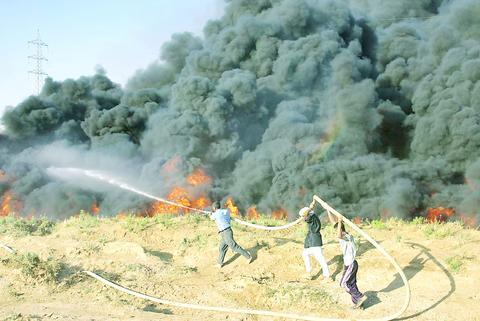Fears that militant attacks will destabilize Saudi Arabia drove crude prices to record highs yesterday in their biggest jump in more than a year, shoving Asian stock markets lower.
The dollar gained on upbeat US economic data, as NYMEX crude oil futures hit a record high of US$42.45 a barrel in Asian trading.
"Even if they are not capable of doing serious damage to oil infrastructure, political instability and the threat to the ruling family is of real concern and promises to haunt the oil market for some time to come," said OPEC analyst Geoff Pyne.

PHOTO: AP
Safe-haven gold rose in early Europe, supported by high oil prices, after being pressured in lower in Asia by the dollar's strength. Spot gold was at US$395.30 an ounce versus US$394.30 in late New York.
Japan's Nikkei average fell 0.5 percent to close at 11,242.34, led lower by exporters and banks. Sharp Corp sank 2.8 percent.
Japan, South Korea and Taiwan are almost entirely dependent on imported oil. Stocks in South Korea and Taiwan sank 1.4 percent and 1.9 percent respectively.
Saudi Oil Minister Ali al-Nuaimi said yesterday that Riyadh and OPEC aim to bring down soaring oil prices to between 22 and 28 dollars a barrel.
"Saudi Arabia and OPEC countries are working to stabilize prices within the price band of US$22 to US$28 per barrel for the OPEC basket of crudes," he told a conference here on the eve of the cartel's extraordinary meeting in Beirut.
OPEC producers, under heavy pressure from consumers to raise production, gathered in Beirut for a meeting overshadowed by a weekend terrorist attack in Saudi Arabia.
EU finance ministers late Tuesday expressed concern that skyrocketing oil prices could jeopardize Europe's fledgling economic recovery, calling on OPEC again to act to calm the market.
OPEC president Purnomo Yusgiantoro told reporters in the Lebanese capital that the oil cartel had the ability to increase production by 12 percent.
But traders are worried that any extra oil may come too late to ward off shortages of gasoline in the US during the peak summer period, and are also fearful of disruption to Saudi Arabian supplies.
"A supply increase will not help lower prices," said Iranian Oil Minister Bijan Zanganeh.
"The fear factor, we cannot control it, we wish we could, but we will do something," Qatari Oil Minister Abdullah al-Attiyah said.
OPEC is considering lifting supply quotas by 2 million to 2.5 million barrels daily, a rise of 8 to 11 percent.
Kuwait's oil minister said on Tuesday his country was increasing oil installation security and was coordinating with fellow Gulf producers to protect against attacks.
The United Arab Emirates will increase oil production this month by 400,000 barrels per day [bpd] over its OPEC quota to help ease record prices, Oil Minister Obeid bin Saif al-Nassiri said yesterday.
"The Emirates will add an extra 400,000 bpd to its production quota in June in response to client demand and to help contain prices on the international market and to stabilize the world economy," Nassiri said, quoted by the state news agency WAM.
The UAE, one of only a few OPEC countries with spare production capacity, has a quota of 2.051 million bpd.

SECURITY: As China is ‘reshaping’ Hong Kong’s population, Taiwan must raise the eligibility threshold for applications from Hong Kongers, Chiu Chui-cheng said When Hong Kong and Macau citizens apply for residency in Taiwan, it would be under a new category that includes a “national security observation period,” Mainland Affairs Council (MAC) Minister Chiu Chui-cheng (邱垂正) said yesterday. President William Lai (賴清德) on March 13 announced 17 strategies to counter China’s aggression toward Taiwan, including incorporating national security considerations into the review process for residency applications from Hong Kong and Macau citizens. The situation in Hong Kong is constantly changing, Chiu said to media yesterday on the sidelines of the Taipei Technology Run hosted by the Taipei Neihu Technology Park Development Association. With

CARROT AND STICK: While unrelenting in its military threats, China attracted nearly 40,000 Taiwanese to over 400 business events last year Nearly 40,000 Taiwanese last year joined industry events in China, such as conferences and trade fairs, supported by the Chinese government, a study showed yesterday, as Beijing ramps up a charm offensive toward Taipei alongside military pressure. China has long taken a carrot-and-stick approach to Taiwan, threatening it with the prospect of military action while reaching out to those it believes are amenable to Beijing’s point of view. Taiwanese security officials are wary of what they see as Beijing’s influence campaigns to sway public opinion after Taipei and Beijing gradually resumed travel links halted by the COVID-19 pandemic, but the scale of

A US Marine Corps regiment equipped with Naval Strike Missiles (NSM) is set to participate in the upcoming Balikatan 25 exercise in the Luzon Strait, marking the system’s first-ever deployment in the Philippines. US and Philippine officials have separately confirmed that the Navy Marine Expeditionary Ship Interdiction System (NMESIS) — the mobile launch platform for the Naval Strike Missile — would take part in the joint exercise. The missiles are being deployed to “a strategic first island chain chokepoint” in the waters between Taiwan proper and the Philippines, US-based Naval News reported. “The Luzon Strait and Bashi Channel represent a critical access

Pope Francis is be laid to rest on Saturday after lying in state for three days in St Peter’s Basilica, where the faithful are expected to flock to pay their respects to history’s first Latin American pontiff. The cardinals met yesterday in the Vatican’s synod hall to chart the next steps before a conclave begins to choose Francis’ successor, as condolences poured in from around the world. According to current norms, the conclave must begin between May 5 and 10. The cardinals set the funeral for Saturday at 10am in St Peter’s Square, to be celebrated by the dean of the College